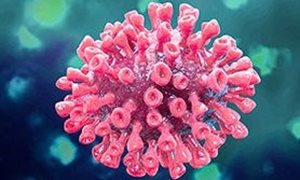28 February 2019
ViiV Healthcare is announcing a five-year collaboration with researchers of the Radboudumc, providing dedicated funding to enhance the HIV-specific capability of the Human Functional Genomics Project (HFGP). The HFGP is a large-scale project that combines detailed patient data with cross-omics information, host immune responses and environmental factors to better understand how the body recognizes and defends itself from disease as well as the signs, symptoms and progression of disease.
Under the supervision of a Scientific Management Board (SMB) comprising representatives from Radboudumc and ViiV Healthcare, Radboudumc will expand the cohort of HIV-infected individuals that are part of the HFGP from 200 to 2000 people. Data from this cohort will be used to look at the predictors and pathways of diseases that are specific to people living with HIV and how they might differ from other disease areas and from healthy people who do not have HIV. Using that information, the goal is to identify early stage drug targets that ViiV Healthcare could use to develop new medicines or approaches to treat HIV infection.
The project, called 'HIV 2000+' will be the first comprehensive cohort study in HIV to use a field of biology called 'cross-omics,' which uses genomics, microbiome metagenomics and metabolomics technologies to better understand the underlying biology associated with HIV infection.
Jan van Lunzen, MD PhD, Head of Translational Medical Research at ViiV Healthcare and project coordinator said: “This project will enable us to establish one of the best characterized cohorts of people living with HIV in the world and will not only help to better define biomarkers and pathways of disease progression, but may also serve as a fantastic platform to find new drug targets.”
The collaboration will combine Radboudumc’s experience in infectious diseases, established networks and scientific techniques with ViiV Healthcare’s expertise and innovation in discovering and developing medicines for HIV.
Mihai Netea said: “This is a unique, first-time collaboration which will combine in-depth clinical and pathophysiological phenotyping with a systems biology approach in a large population of patients with HIV. It is a unique chance to understand the HIV infection and its complications better, and to partner with ViiV Healthcare to translate that knowledge to the bed of the patient.”
A SMB, comprising members from both Radboudumc and ViiV Healthcare, will provide both scientific and financial oversight of the collaboration. An Independent Scientific Advisory Board will be formed to advise the SMB.
 André van der Ven and Mihai Netea, theme Infectious diseases and global health, and colleagues, will receive 15 million Euro from pharmaceutical company ViiV Healthcare for research into new ways to fight the HIV virus. The aim of the HIV 2000+ project is to identify new drug targets for HIV.
André van der Ven and Mihai Netea, theme Infectious diseases and global health, and colleagues, will receive 15 million Euro from pharmaceutical company ViiV Healthcare for research into new ways to fight the HIV virus. The aim of the HIV 2000+ project is to identify new drug targets for HIV.
ViiV Healthcare is announcing a five-year collaboration with researchers of the Radboudumc, providing dedicated funding to enhance the HIV-specific capability of the Human Functional Genomics Project (HFGP). The HFGP is a large-scale project that combines detailed patient data with cross-omics information, host immune responses and environmental factors to better understand how the body recognizes and defends itself from disease as well as the signs, symptoms and progression of disease.
Under the supervision of a Scientific Management Board (SMB) comprising representatives from Radboudumc and ViiV Healthcare, Radboudumc will expand the cohort of HIV-infected individuals that are part of the HFGP from 200 to 2000 people. Data from this cohort will be used to look at the predictors and pathways of diseases that are specific to people living with HIV and how they might differ from other disease areas and from healthy people who do not have HIV. Using that information, the goal is to identify early stage drug targets that ViiV Healthcare could use to develop new medicines or approaches to treat HIV infection.
The project, called 'HIV 2000+' will be the first comprehensive cohort study in HIV to use a field of biology called 'cross-omics,' which uses genomics, microbiome metagenomics and metabolomics technologies to better understand the underlying biology associated with HIV infection.
Jan van Lunzen, MD PhD, Head of Translational Medical Research at ViiV Healthcare and project coordinator said: “This project will enable us to establish one of the best characterized cohorts of people living with HIV in the world and will not only help to better define biomarkers and pathways of disease progression, but may also serve as a fantastic platform to find new drug targets.”
The collaboration will combine Radboudumc’s experience in infectious diseases, established networks and scientific techniques with ViiV Healthcare’s expertise and innovation in discovering and developing medicines for HIV.
Mihai Netea said: “This is a unique, first-time collaboration which will combine in-depth clinical and pathophysiological phenotyping with a systems biology approach in a large population of patients with HIV. It is a unique chance to understand the HIV infection and its complications better, and to partner with ViiV Healthcare to translate that knowledge to the bed of the patient.”
Deal terms
ViiV Healthcare will fully fund the five-year collaboration that will analyze cross-omics data from 2,000 HIV-infected patients and compare this data to that from other disease-areas and to data from healthy volunteers. Scientists from both Radboudumc and ViiV Healthcare will collaborate closely on the work packages that will be formed as part of the collaboration.A SMB, comprising members from both Radboudumc and ViiV Healthcare, will provide both scientific and financial oversight of the collaboration. An Independent Scientific Advisory Board will be formed to advise the SMB.
-
Want to know more about these subjects? Click on the buttons below for more news.
Related news items

Trained immunity: a tool for reducing susceptibility to and the severity of SARS-CoV-2 infection
17 February 2021 In a review in Cell Mihai Netea, Frank van de Veerdonk, Reinout van Crevel and Jorge Dominguez Andres propose that induction of trained immunity by whole-microorganism vaccines may represent an important tool for reducing susceptibility to and severity of SARS-CoV-2. read more
Invasive fungal infections in influenza and COVID-19
8 July 2020 The Aspergillus fungus is found in the lungs of many COVID patients. A parallel occurs with influenza patients, who often develop a serious fungal infection. Although such a serious fungal infection seems to occur less frequently in COVID-patients, alertness remains necessary, read more
Trained immunity: a tool for reducing susceptibility to and the severity of SARS-CoV-2 infection
29 June 2020 In a review in Cell Mihai Netea, Frank van de Veerdonk, Reinout van Crevel and Jorge Dominguez Andres propose that induction of trained immunity by whole-microorganism vaccines may represent an important tool for reducing susceptibility to and severity of SARS-CoV-2. read more
Study into better protection for healthcare workers against coronavirus infection
19 March 2020 Radboudumc and UMC Utrecht will investigate whether health care workers are better protected against the coronavirus after a vaccination against tuberculosis (BCG vaccine). This vaccine does not directly protect against the coronavirus, but provides a boost to the immune system. read more
International grants for tuberculous meningitis research
27 March 2019Meningitis is the most deadly manifestation of tuberculosis. Two grants have been awarded to Radboudumc researchers.
read more
